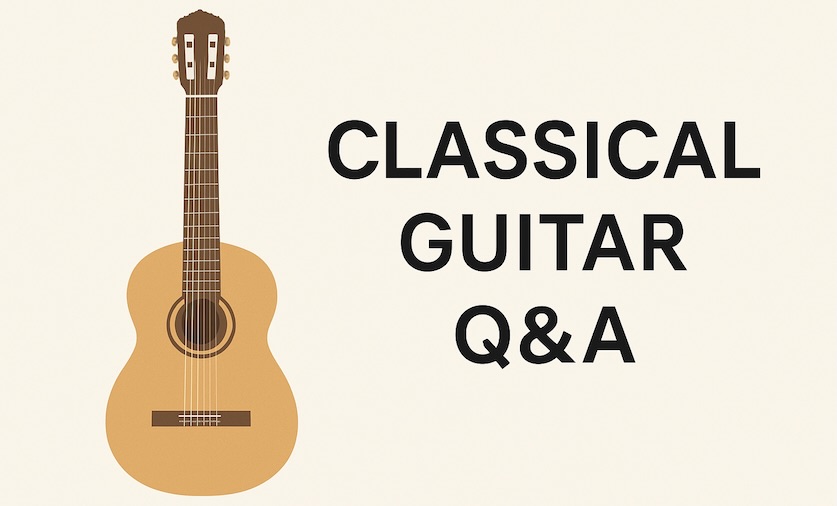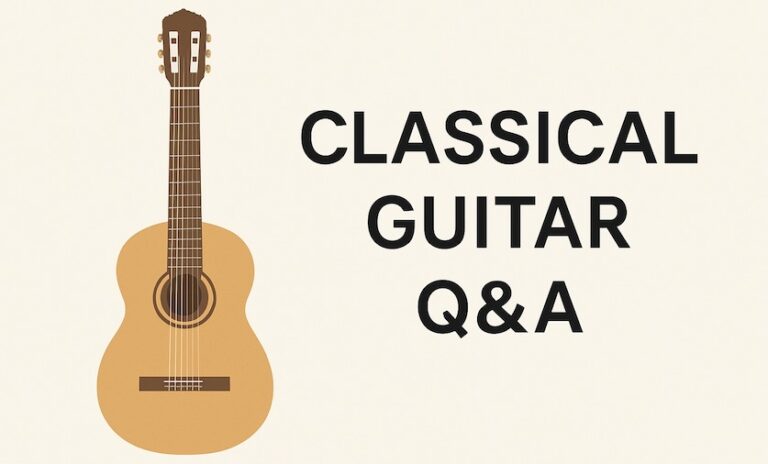
Question: How do you know when to upgrade your classical guitar?
When your skill set and requirements for either performing, recording, or listening outpace the instrument it’s time to get a new classical guitar. But there are many variables to this question depending on the player, their current instrument, their skill level, if they are performing in large halls, and their financial situation.
Just as refinement in playing comes in small increments, so does improvement in guitars as the cost goes up. That said, the more refined your playing becomes the more you will want to match that skill with a refined instrument that, as a tool for music making, helps you accomplish your goals.
Super tricky question for me to answer but I’ll try to offer some criteria and advice as best I can.
Please note: Remember to not get distracted by wanting a new guitar. Even the best pros can make beautiful music on an inexpensive guitar so don’t let it ever get in the way of your practice or music making. Enjoy each instrument for it’s unique qualities and get back to work. Also, don’t forget to use quality strings and to replace them often, this can breathe new life into your guitar.
Responsiveness and balance – The ability to bring a note out of a musical texture is very important. A responsive instrument will allow you to do this with less effort. The balance of the instrument across the strings is also important as it creates an equalization that ensures rogue notes won’t pop out. You also want definition and clarity along with a pleasing sound and inexpensive guitars have a tendency to be muddy and lack definition. In general, inexpensive guitars have less of these qualities. So if you are finding it difficult to refine your sound in this regard it is either time for more technique practice or time for a new guitar.
Sustain – In general, better guitars have better sustain compared to beginner instruments. Beginner guitars also have a tendency to have ‘dead notes’ that don’t sustain well. A quality instrument is going to have pretty good sustain on all the notes in a balanced way.
Tone Quality – Great guitars have great tone…usually. Some guitars emphasize certain elements over others so you can have a high end guitar with terrible tone (whatever that means). But in general, most people buying an expensive guitar expect the quality of the sound to be pleasing.
Volume – Volume isn’t everything but if you are playing in large halls or ensemble music with others it is certainly a factor. Funny thing though, expensive concert guitars are intended for good projection in large halls. Sometimes, student guitars can be just fine in the practice room but get them into a hall and they suffer dramatically. But if you are struggling to get more volume from your instrument and are pushing it way too far and getting a bad sound due to extended effort it may be time for a guitar that has a bit more volume and a better effort-to-volume ratio. But volume is relative and there is nothing wrong with a softer guitar if the balance is good. You don’t want to emphasize volume over other elements like tone quality.
The Player – One of the biggest reasons a player sometimes wants a new guitar is not just upgrading from their inexpensive beginner guitar but because they want a particular sound and responsiveness from their instrument. At other times they may just want a change to spice up their practice sessions. Some of this comes down to personal preference but also the repertoire they are playing and their aspirations in music.
Consider Your Skill Level – It takes skill to make a professional level instrument sound its best. Don’t get me wrong, an expensive guitar will help you but it won’t ‘solve all your problems’. In some cases it won’t help at all. Some concert level instruments are designed for players with advanced technique and the action is high and more difficult to play because pros are digging in hard to the strings to reach the listeners in the back row of the concert hall. Just because you’ve bought an expensive guitar doesn’t mean you be able to utilize it to it’s fullest. But it is a good investment in your skill and you will grow into it as your develop your technique.
Some advice on financial vs quality considerations
If you can afford a great instrument, go for it. It’s your art, your tool, and your friend. If you are buying a single-luthier made guitar it is also a work of art and you are supporting the culture of guitar making.
If you are more on a budget you’ll have to pace yourself. With my students I usually recommend their first guitar be of a minimum quality (for examples, a Cordoba C5 or C7). So, not expensive but not super cheap either. The solid woods and design usually mean that the student can play the instrument for a few years and not have any huge concerns.
Once the student is starting to refine their skills, perform, or just practice more regularly, they usually jump to an instrument in the $800-2000 range. Then they have an instrument that won’t hold them back as they enter the intermediate playing level. It’s not a super responsive or loud instrument but it does fine and sounds good.
At this point I usually stop the student from buying instruments in small increments and encourage them to save up for a professional level guitar. Buying in increments is difficult and the difference between the instruments is not always very large. That said, there are few new companies offering guitars that aim to keep up with expensive single-luthier instruments. But the best guitars are still made by luthiers who have honed their skills and give individual attention to the woods being used and their design.
There are too many variables at this point. A career-path student playing in halls or next to other students who have nice guitars will need either a professional level instrument or a special workhorse guitar that emphasizes volume and responsiveness in order to keep up. A hobbyist practicing at home for themselves may not need volume so they can do with other elements in a guitar. The variations are endless.
Final advice
Socialize with other guitarists and ask an advanced guitarist if you can try their instrument and compare it to yours. People are usually very open and friendly in the classical guitar world and willing to let you play their instrument if you are careful and respectful. Ask them how to be careful with their instrument. This will allow you to see what a new guitar can possibly do for you.
Questions & Support
If you need clarification on this particular Q&A please leave a comment below. For new and existing questions please visit the main Classical Guitar Q&A page. If you are enjoying the free Q&As you can support the site here.



Wish I could find more classical guitarists near me. It has taken me some time just to determine the best size guitar for me. Good thing I was able to find decent used instruments that didn’t break the bank. First, I bought a Kenny Hill player 615mm 48mm nut, that has fantastic sound but is really too small for me. Then I bought a Kremona Rominda 650mm scale length, 52mm nut that was fine until my arthritis became an issue. Like Tim Trivett, I discovered the Cordoba C9 parlor – 630mm scale and 50mm nut – was a good fit. Sounds almost as good as the Kenny Hill. I recently moved and I’m still trying to find a good luthier to set it up for me. The action’s a bit high but it’s playable. At least I know what size I want if I ever play well enough to deserve an upgrade to concert level.
Thanks for sharing!
Really good advice. It helps me keep my expectations realistic. However, when I returned to the guitar a few years ago after a 40 year absence I decided to upgrade from my $60 student guitar from the 1970’s (with terrible intonation) and buy a guitar that would inspire me. I ended up spending far more than I intended (based on one of your reviews) and I’ve never regretted it. The sound is gorgeous and it makes me want to play it more.
Having said that, it’s fun to see Alexandra Whittingham’s YouTube videos where she plays her first guitar which came from a charity shop and cost £1. It proves your point that pros can play any guitar and make it sound good.
What guitar did you end up buying?
I bought a Cordoba C9 Parlor. The smaller scale helped because of my small hands and reduced flexibility than when I was younger. I had a luthier adjust the action for me to add to its playability. All these factors combined to add to my enjoyment of it.
Great to hear that. I wonder how many people never get their guitars worked on!
I’m considering upgrading my Cordoba Dolce to a C9 Parlor or C10 Parlor. Curious to know what you had your action adjusted to. My Dolce is 3.5mm on the low E and 3mm at the high E.
I did not adjust the action from the factory settings. Sadly, the C10 parlor is no longer made so you’ll have to consider the C9 or a different brand.